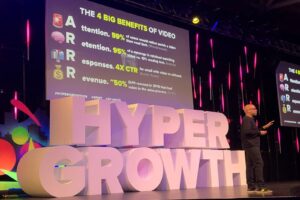
For as long as I can remember I’d always been the quiet one, the one who didn’t speak up in class, the ‘Oh I knew that but was too shy to say anything’ person. I’d always been used to taking the back seat and letting others take the limelight - but I actually always wanted to be the person who took control and had confidence in themselves.
When I entered the big world of work I soon realised that you make your own successes and need to get your voice and individual skills seen and heard to really make an impact. I knew how to speak up, but I definitely needed a confidence boost and I needed to really hone in on techniques in order to get noticed.
I’d always dreamed of being on stage, whether that be speaking at an industry event, singing Gwen Stefani's Hollaback Girl on karaoke (that song single-handedly taught me how to spell ‘bananas’) or just being a diva. But, I never knew how I’d find the confidence.
Anyway, fast forward to my current role at Aira as a digital PR consultant, and I - very much on a whim - decided to put my name forward to speak at our biannual company conference, MKGO. With just a few months to go, I realised that I actually needed to find the courage to take the steps up onto the stage in front of 200+ people.
I knew I needed to do some training, so I started to research a few different workshops and stumbled across Kirsty Hulse’s Women’s Confidence Workshop. Some colleagues and I ventured up to a really cool venue in Birmingham called Lost & Found and met Kirsty for a day of training and fun.
We began our training day by getting to know each other and breaking down any nervous barriers any of us had. Kirsty got us to stand at the front of the room and we had to talk about a random topic for one minute. Now that sounds easy, right? But for someone who isn’t very confident in front of crowds and goes red when put on the spot, it wasn’t easy at all.
Once we’d blabbed on for a minute about random subjects such as: why clowns scare us, how to stalk a celebrity and how to feng shui your bedroom, it was onto the more scientific and factual part of the day.
Kirsty went through a lot of research about how we physically get nervous - pretty much, it’s because our brains are naturally hardwired to make us panic. We learned that part of our brain, known as the prefrontal cortex (PFC) is the area that works the hardest and processes important things. It is essentially the problem-solving part of the brain and will be your best friend if you’re speaking publicly. But, there is another part of our brain called the limbic system, which is responsible for our emotions. It’s clear that the PFC and limbic systems are very different, and it can be a real struggle to balance them both and get them to work together.
Now, this isn’t ideal if you’re stood in front of 200+ people in a conference hall. But there are ways to manage both systems and make them work alongside one another. Kirsty shared a few techniques that would help us focus and dampen our emotions and fears to make sure our PFC didn’t leave us in the lurch. Here are just a few of them:
Labelling
Labelling is when we force ourselves to acknowledge how we are feeling and discuss it with both ourselves and others. This way it fires up the PFC but also dampens the limbic system because it shows we are in control.
One top tip from Kirsty was to really focus on labelling how you’re feeling by pointing out keywords, such as: overwhelmed, scared, shy, out of depth. This way it allows you to really combat your feelings and feel better (somewhat like Beyoncé) before going on stage.
Normalising
It’s important to understand that everyone feels nervous and goes through an ‘Oh sh*t’ moment before going on stage - it is overwhelming getting up in front of 200+ people and if you really care about it, it shouldn’t feel easy.
So, Kirsty suggested that we thoroughly think about other people, maybe even our idols, and how they will also experience nerves. We’re only human, remember.
Repositioning
Repositioning was something that I found really helpful before going on stage. It is when you change the perspective to the third person and imagine an idol, family member or friend on stage instead of you. This way, if you can imagine them doing it - when they don’t specialise in your profession - then you are certainly capable of owning it.
Distancing
Distancing, otherwise known as ‘zooming out’, is when you picture yourself post-public speaking and visualise that it has gone very well. Zooming out and thinking about how you will feel two or three months down the line enables you to understand that actually, this big talk is very minuscule in the grand scheme of things.
Reframing
Reframing is very simply changing your point of view. I struggled with this suggestion just because I think it’s easier said than done to just switch your perspective up and instantaneously be positive.
Ahead of my talk, I found both labelling and repositioning to be the most successful tactics. They enabled me to get up on stage and nail my talk at MKGO with no stutters, without going red and being able to project my voice across the room.
Not only did I receive some great feedback, but I have also put myself forward for another conference in September.
Kirtsy’s training really helped me understand not only that it is natural to feel nervous, but that actually you have the ability, as a human, to overcome nerves and trick your brain into thinking a certain way. Essentially, you can hardwire your brain into new beliefs and positive thinking to help conquer scary things such as public speaking.
My key take-home from Kirsty’s training
Practice really does make perfect. If you can rehearse something a certain amount of times, your brain will remember it (even if you are stood in front of a room full of people). Having the backup plan of actually knowing your content and knowing it is hardwired into your brain will help ease your limbic system and ultimately let your PFC work in beast-mode.






